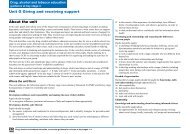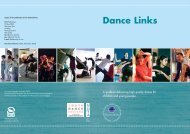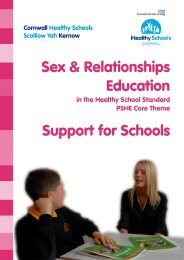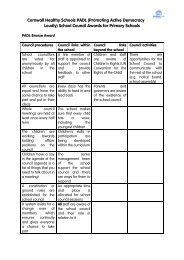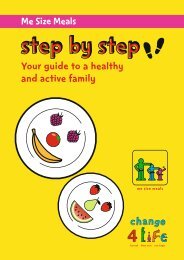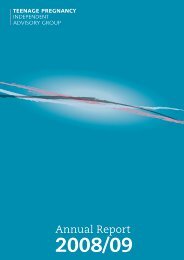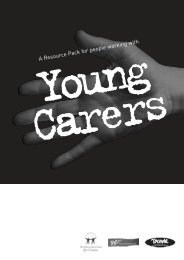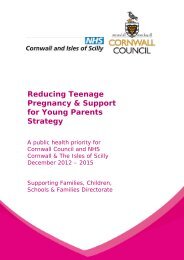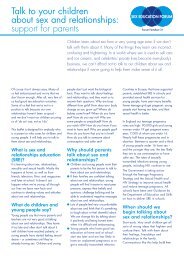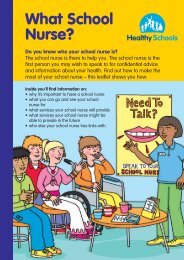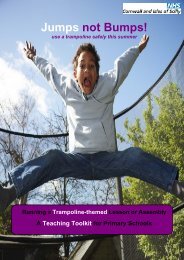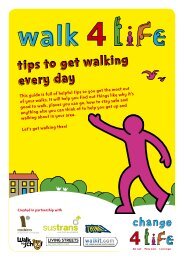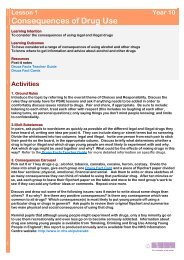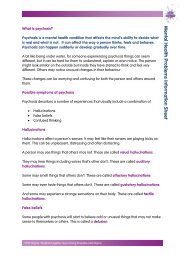Relationships and sex education: fpa factsheet - Cornwall Healthy ...
Relationships and sex education: fpa factsheet - Cornwall Healthy ...
Relationships and sex education: fpa factsheet - Cornwall Healthy ...
Create successful ePaper yourself
Turn your PDF publications into a flip-book with our unique Google optimized e-Paper software.
Factsheet<br />
Sex <strong>and</strong> relationships <strong>education</strong> April 2009<br />
Sex <strong>and</strong> relationships <strong>education</strong> (SRE) can be<br />
defined as ʻlearning about <strong>sex</strong>, <strong>sex</strong>uality,<br />
emotions, relationships, <strong>sex</strong>ual health <strong>and</strong><br />
ourselvesʼ, which should be an integral part of a<br />
lifelong learning process. 1<br />
Definition of Key stages:<br />
Key stage 1: 5–7 years old<br />
Key stage 2: 7–11 years old<br />
Key stage 3: 11–14 years old<br />
Key stage 4: 14–16 years old<br />
Legislation <strong>and</strong> government policy<br />
Engl<strong>and</strong><br />
Legal framework for SRE<br />
The Education Act 1996 consolidated all previous<br />
legislation, <strong>and</strong> key points related to SRE are:<br />
n The <strong>sex</strong> <strong>education</strong> elements of the National<br />
Curriculum Science Order are m<strong>and</strong>atory for all<br />
pupils of primary <strong>and</strong> secondary school age.<br />
These cover anatomy, puberty, biological<br />
aspects of <strong>sex</strong>ual reproduction <strong>and</strong> use of<br />
hormones to control <strong>and</strong> promote fertility.<br />
n Secondary schools are required to provide an<br />
SRE programme which includes (as a<br />
minimum) information about <strong>sex</strong>ually<br />
transmitted infections (STIs) <strong>and</strong> HIV/AIDS<br />
n Other elements of personal, social <strong>and</strong> health<br />
<strong>education</strong> (PSHE), including SRE, are<br />
nonstatutory.<br />
n All schools must provide, <strong>and</strong> make available<br />
for inspection, an up-to-date policy describing<br />
the content <strong>and</strong> organisation of SRE outside of<br />
national curriculum science. This is the school<br />
governorsʼ responsibility.<br />
n Primary schools should have a policy statement<br />
that describes the SRE provided or gives a<br />
statement of the decision not to provide SRE.<br />
The Learning <strong>and</strong> Skills Act 2000 requires that:<br />
n young people learn about the nature of<br />
marriage <strong>and</strong> its importance for family life <strong>and</strong><br />
bringing up children.<br />
n young people are protected from teaching <strong>and</strong><br />
materials which are inappropriate, having<br />
regard to the age <strong>and</strong> the religious <strong>and</strong> cultural<br />
background of the pupils concerned<br />
n school governing bodies have regard for the<br />
guidance<br />
n parents have the right to withdraw their child<br />
from all or part of SRE provided outside<br />
national curriculum science<br />
Following a review 2 , the Government<br />
announced in October 2008 that comprehensive<br />
SRE will be made compulsory as a part of a<br />
statutory PSHE curriculum 3 .<br />
Government guidance on personal, social <strong>and</strong><br />
health <strong>education</strong> (PSHE)<br />
The aspects of SRE that are not included in the<br />
science curriculum are delivered through<br />
personal, social <strong>and</strong> health <strong>education</strong> (PSHE).The<br />
Government is committed to improving SRE as<br />
part of PSHE <strong>and</strong> citizenship, which is also<br />
supported by the National <strong>Healthy</strong> Schools<br />
Programme (NHSP). 4 PSHE <strong>and</strong> citizenship are<br />
non-statutory at Key stages 1<strong>and</strong> 2. At Key<br />
stages 3 <strong>and</strong> 4 citizenship becomes statutory,<br />
although PSHE remainsnon-statutory.<br />
The Qualifications <strong>and</strong> Curriculum Authority<br />
(QCA) publishes guidance on the whole<br />
curriculum. A new national curriculum, published<br />
in 2000, outlined the non-statutory framework for<br />
PSHE <strong>and</strong> citizenship for all four key stages,<br />
which includes learning about <strong>sex</strong> <strong>and</strong><br />
relationships. 5,6 This was followed in 2005 by<br />
guidance on what is expected to be learned at<br />
every key stage. 7<br />
© <strong>fpa</strong>. <strong>fpa</strong>, 50 Featherstone Street, London EC1Y 8QU. Tel 020 7608 5240. Fax 0845 123 2349. The Family<br />
Planning Association is a registered charity, number 250187, <strong>and</strong> a limited liability company registered in Engl<strong>and</strong>,<br />
number 887632.
Sex <strong>and</strong> relationships <strong>education</strong> (cont)<br />
A new secondary school curriculum was<br />
introduced from September 2008 which extends<br />
PSHE to include economic <strong>education</strong>. Initially<br />
only introduced for students in year seven, this<br />
will eventually replace the current programmes<br />
of study. 8<br />
Government guidance on SRE 9<br />
In 2000, the Department for Education <strong>and</strong><br />
Employment (now the Department for Children,<br />
Schools <strong>and</strong> Families) published guidance on the<br />
delivery of SRE through the PSHE framework. The<br />
guidance aims to help schools to plan SRE policy<br />
<strong>and</strong> practice <strong>and</strong> includes teaching strategies,<br />
working with parents, <strong>and</strong> confidentiality.<br />
n There should be an emphasis on developing<br />
knowledge, skills <strong>and</strong> attitudes <strong>and</strong> appropriate<br />
teaching methods.<br />
n Primary schools should ensure that both boys<br />
<strong>and</strong> girls know about puberty before it begins.<br />
n Teachers should develop activities that will<br />
involve boys <strong>and</strong> young men as well as girls<br />
<strong>and</strong> young women.<br />
n Policies should be developed in consultation<br />
with parents, young people, teachers <strong>and</strong><br />
governors.<br />
n All schools have a duty to ensure that the<br />
needs of children with special needs <strong>and</strong><br />
learning disabilities are properly met.<br />
n Puberty, menstruation, contraception, abortion,<br />
safer <strong>sex</strong>, HIV/AIDS <strong>and</strong> STIs should be<br />
covered.<br />
n The needs of all pupils should be met,<br />
regardless of <strong>sex</strong>ual orientation or ethnicity.<br />
n SRE should be planned <strong>and</strong> delivered as part<br />
of PSHE <strong>and</strong> citizenship.<br />
Elements of the guidance are supported by the<br />
Learning <strong>and</strong> Skills Act 2000.<br />
Wales<br />
Legal framework for SRE<br />
Under the Education Act 2002, SRE became a<br />
compulsory part of the basic curriculum in all<br />
secondary schools. Primary schools are also<br />
required to have a policy on SRE, outlining<br />
details of their SRE programme or explaining<br />
their decision not to provide SRE. The Welsh<br />
Assembly Government recommends that<br />
primary schools have a graduated programme<br />
of SRE tailored to the age <strong>and</strong> emotional<br />
maturity of the children.<br />
Personal <strong>and</strong> social <strong>education</strong> (PSE) became a<br />
compulsory part of the basic curriculum in both<br />
primary <strong>and</strong> secondary schools in September<br />
2003. 10 Schools are expected to base their<br />
provision of SRE <strong>and</strong> PSE on guidance produced<br />
by the Welsh Assembly Government.<br />
Welsh Assembly Government guidance<br />
From autumn 2008 all schools, colleges <strong>and</strong><br />
other learning providers in Wales have been<br />
basing their PSE provision for 7–19 year olds<br />
on a new framework published by the Welsh<br />
Assembly Government. 11 The five themes of the<br />
framework are:<br />
n active citizenship<br />
n health <strong>and</strong> emotional wellbeing (which includes<br />
SRE)<br />
n moral <strong>and</strong> spiritual development<br />
n preparing for lifelong learning<br />
n sustainable development <strong>and</strong> global citizenship.<br />
Learning outcomes are set out for each theme at<br />
each key stage.<br />
SRE guidance<br />
The National Assembly for Wales published<br />
guidance in 2002 12 on how schools should<br />
develop SRE policy, teach SRE, h<strong>and</strong>le sensitive<br />
issues, <strong>and</strong> work with parents <strong>and</strong> the wider<br />
community.<br />
The guidance highlights key points that schools<br />
need to address through their provision of SRE:<br />
n Both boys <strong>and</strong> girls should be prepared for<br />
puberty.<br />
n Girls should be prepared for menstruation<br />
before their periods start.<br />
© <strong>fpa</strong>. <strong>fpa</strong>, 50 Featherstone Street, London EC1Y 8QU. Tel 020 7608 5240. Fax 0845 123 2349. The Family<br />
Planning Association is a registered charity, number 250187, <strong>and</strong> a limited liability company registered in Engl<strong>and</strong>,<br />
number 887632.
Sex <strong>and</strong> relationships <strong>education</strong> (cont)<br />
n Young people need access to, <strong>and</strong> full<br />
information about, confidential contraceptive<br />
information, advice <strong>and</strong> services.<br />
n Young people need to be aware of the moral <strong>and</strong><br />
personal dilemmas that can be involved in<br />
abortion <strong>and</strong> how to access a relevant agency if<br />
necessary.<br />
n Young people need to be aware of the risks of<br />
STIs including HIV/AIDS <strong>and</strong> know about<br />
prevention, diagnosis <strong>and</strong> treatment.<br />
n Young people need to know what safer <strong>sex</strong> is<br />
<strong>and</strong> why it is important. They also need to build<br />
the confidence <strong>and</strong> skills to negotiate safer <strong>sex</strong><br />
with a partner.<br />
Scotl<strong>and</strong><br />
There is no statutory requirement in Scotl<strong>and</strong> for<br />
schools to teach <strong>sex</strong> <strong>education</strong>.<br />
In 2001, the Scottish Executive published a<br />
circular on <strong>sex</strong> <strong>education</strong> in Scottish schools<br />
which encouraged all schools to provide <strong>sex</strong><br />
<strong>education</strong> within a comprehensive programme of<br />
personal, social <strong>and</strong> health <strong>education</strong> <strong>and</strong><br />
religious <strong>and</strong> moral <strong>education</strong>. 13<br />
Relevant national advice <strong>and</strong> guidelines on <strong>sex</strong><br />
<strong>education</strong> for all stages of schooling was<br />
summarised by the Scottish Executive in 2001. 14<br />
This requires that <strong>sex</strong> <strong>education</strong> should present<br />
facts in an objective, balanced <strong>and</strong> sensitive<br />
manner within a framework of social values, but<br />
programmes will vary between local authorities<br />
<strong>and</strong> schools.<br />
Schools are expected to:<br />
n make sure that <strong>sex</strong> <strong>education</strong> takes account of<br />
each childʼs age, underst<strong>and</strong>ing <strong>and</strong> stage of<br />
development<br />
n work in partnership with parents<br />
n have simple, direct procedures in place for<br />
parents to raise concerns<br />
n have a method of consulting with pupils<br />
n respect the different cultural, ethnic <strong>and</strong><br />
religious environments of the home<br />
n respect the different home circumstances <strong>and</strong><br />
needs of all young people.<br />
Parents can withdraw their children from all or part<br />
of a planned <strong>sex</strong> <strong>education</strong> programme. They are<br />
expected to discuss with the head teacher how<br />
they intend to provide this <strong>education</strong> themselves.<br />
Guidance is available for schools on how to<br />
consult effectively with parents <strong>and</strong> carers. 15<br />
Northern Irel<strong>and</strong><br />
Legal framework for relationships <strong>and</strong> <strong>sex</strong>uality<br />
<strong>education</strong> (RSE)<br />
RSE is included on a statutory basis in the school<br />
curriculum through the science programme of study<br />
<strong>and</strong> a learning area covering personal development.<br />
From September 2007 a revised school<br />
curriculum introduced personal development<br />
<strong>and</strong> mutual underst<strong>and</strong>ing (PDMU) in primary<br />
schools, which develops into learning for life<br />
<strong>and</strong> work (LLW) in post-primary schools. 16<br />
At Key stage 3, pupils should have opportunities to:<br />
n explore the qualities of relationships including<br />
friendship<br />
n explore the qualities of a loving, respectful<br />
friendship<br />
n develop coping strategies to deal with<br />
challenging relationship scenarios<br />
n develop strategies to avoid <strong>and</strong> resolve conflict<br />
n explore the implications of <strong>sex</strong>ual maturation<br />
n explore the emotional, social <strong>and</strong> moral<br />
implications of early <strong>sex</strong>ual activity. 17<br />
At Key stage 4, three of the skills that pupils<br />
should develop are:<br />
n recognising, assessing <strong>and</strong> managing risk in a<br />
range of real-life contexts<br />
n developing their underst<strong>and</strong>ing of relationships<br />
<strong>and</strong> <strong>sex</strong>uality <strong>and</strong> the responsibilities of healthy<br />
relationships<br />
n an underst<strong>and</strong>ing of the roles <strong>and</strong> responsibilities<br />
of parenting. 17<br />
Government guidance.<br />
All schools should have a written policy on RSE<br />
<strong>and</strong> there is guidance to assist schools to<br />
© <strong>fpa</strong>. <strong>fpa</strong>, 50 Featherstone Street, London EC1Y 8QU. Tel 020 7608 5240. Fax 0845 123 2349. The Family<br />
Planning Association is a registered charity, number 250187, <strong>and</strong> a limited liability company registered in Engl<strong>and</strong>,<br />
number 887632.
Sex <strong>and</strong> relationships <strong>education</strong> (cont)<br />
develop an appropriate policy <strong>and</strong> a programme<br />
18, 19, 20, 21<br />
of study.<br />
See <strong>fpa</strong> Northern Irel<strong>and</strong> <strong>factsheet</strong> <strong>Relationships</strong><br />
<strong>and</strong> <strong>sex</strong>uality <strong>education</strong> in schools for further<br />
information.<br />
Confidentiality<br />
The SRE guidance in each country aims to help<br />
schools in drawing up their own policy on<br />
confidentiality, which should be clear, meet the<br />
best interests of young people <strong>and</strong> be workable<br />
by staff. 9, 12, 14, 18 Policies <strong>and</strong> guidance may vary<br />
in different parts of the UK.<br />
Teachers will not always be able to maintain<br />
confidentiality where a young person discloses<br />
information either in the classroom or in a one-toone<br />
situation. Where they believe that a young<br />
person is at risk of physical or <strong>sex</strong>ual abuse, the<br />
school child protection procedures should be<br />
followed, <strong>and</strong> there is specific guidance for<br />
22, 23, 24, 25<br />
<strong>education</strong> authorities on this.<br />
Teachers are not legally obliged to inform<br />
anyone if they learn of or suspect <strong>sex</strong>ual activity<br />
in pupils under the age of consent (16 in each<br />
UK country) if there is no evidence of abuse or<br />
exploitation. However, all school staff should be<br />
familiar with <strong>and</strong> follow their schoolʼs<br />
confidentiality <strong>and</strong> safeguarding (child<br />
protection) policies regarding disclosure. If a<br />
teacher learns that a pupil under the age of<br />
consent is <strong>sex</strong>ually active they should<br />
encourage the young person to talk with a<br />
parent or carer, ensure that any child protection<br />
issue is addressed, <strong>and</strong> provide adequate<br />
information about confidential <strong>sex</strong>ual health<br />
advice <strong>and</strong> treatment services. This information<br />
should be freely available to all pupils.<br />
Local policies may vary, particularly around<br />
child protection issues for young people under<br />
the age of 13.<br />
School nurses <strong>and</strong> other outside visitors involved<br />
in the delivery of SRE should follow the schoolʼs<br />
confidentiality <strong>and</strong> SRE policy. In one-to-one<br />
clinical situations, health professionals <strong>and</strong> other<br />
outside visitors are bound by their professional<br />
codes of practice.<br />
Is SRE beneficial?<br />
Reviews of international research show that<br />
school-based SRE, particularly when linked to<br />
contraceptive services, does not increase <strong>sex</strong>ual<br />
activity, but can have a positive impact on young<br />
peopleʼs knowledge <strong>and</strong> attitudes, delay <strong>sex</strong>ual<br />
activity <strong>and</strong>/or reduce pregnancy rates by the use<br />
26, 27<br />
of contraception <strong>and</strong> safer <strong>sex</strong>.<br />
In Engl<strong>and</strong>, a review of the Teenage pregnancy<br />
strategy identified strong delivery of SRE <strong>and</strong><br />
PSHE by schools as a key feature of high<br />
performing local authorities where teenage<br />
pregnancy rates had gone down. 28 There is no<br />
evidence that abstinence-only <strong>education</strong><br />
programmes delay the initiation of <strong>sex</strong>, increase<br />
a return to abstinence or decrease the numbers<br />
27, 29<br />
of <strong>sex</strong>ual partners.<br />
Parentsʼ <strong>and</strong> young peopleʼs views of<br />
SRE<br />
Many organisations support the call for PSHE to<br />
30, 31<br />
become a statutory subject.<br />
Surveys show that the majority of the general<br />
public, 32, 33 parents, 34, 35 young people, 36, 37 <strong>and</strong><br />
<strong>education</strong> professionals 38 agree with this, <strong>and</strong><br />
think that SRE should cover emotional <strong>and</strong><br />
relationship issues as well as biological aspects.<br />
In one UK survey 36 of over 20,000 young people<br />
aged under 18:<br />
n 40 per cent thought the SRE they had received<br />
was either poor or very poor<br />
n 61 per cent of boys <strong>and</strong> 70 per cent of girls<br />
reported not having any information about<br />
personal relationships at school<br />
n 73 per cent felt that SRE should be taught<br />
before the age of 13.<br />
© <strong>fpa</strong>. <strong>fpa</strong>, 50 Featherstone Street, London EC1Y 8QU. Tel 020 7608 5240. Fax 0845 123 2349. The Family<br />
Planning Association is a registered charity, number 250187, <strong>and</strong> a limited liability company registered in Engl<strong>and</strong>,<br />
number 887632.
Sex <strong>and</strong> relationships <strong>education</strong> (cont)<br />
References<br />
1 Sex Education Forum, Sex <strong>and</strong><br />
<strong>Relationships</strong> Education Framework<br />
(London: Sex Education Forum, 2005).<br />
www.ncb.org.uk.<br />
2 Review of Sex <strong>and</strong> <strong>Relationships</strong> Education<br />
(SRE) in Schools. A Report by the External<br />
Steering Group (2008).www.teachernet.gov.uk<br />
3 Department for Children, Schools <strong>and</strong><br />
Families, Government Response to the Report<br />
by the Sex <strong>and</strong> <strong>Relationships</strong> Education<br />
(SRE) Review Steering Group (London:<br />
DCSF, 2008). www.teachernet.gov.uk.<br />
4 Department of Health, National <strong>Healthy</strong><br />
Schools Status: A Guide for Schools (London:<br />
Department of Health, 2005).<br />
5 Qualifications <strong>and</strong> Curriculum Authority,<br />
National Curriculum H<strong>and</strong>book for Primary<br />
Teachers in Engl<strong>and</strong>: Key Stages 1 <strong>and</strong> 2<br />
(London: The Stationery Office, 2000).<br />
6 Qualifications <strong>and</strong> Curriculum Authority,<br />
National Curriculum H<strong>and</strong>book for Secondary<br />
Teachers in Engl<strong>and</strong>: Key Stages 3 <strong>and</strong> 4<br />
(Rev ed, London: Qualifications <strong>and</strong><br />
Curriculum Authority, 2005).<br />
7 Qualifications <strong>and</strong> Curriculum Authority, PSHE<br />
at Key Stages 1–4: Guidance on Assessment,<br />
Recording <strong>and</strong> Reporting (London:<br />
Qualifications <strong>and</strong> Curriculum Authority, 2005).<br />
, accessed 13<br />
November 2007.<br />
8 Qualifications <strong>and</strong> Curriculum Authority,<br />
Personal, Social, Health <strong>and</strong> Economic<br />
Education. ,<br />
accessed 28 October 2008.<br />
9 Department for Education <strong>and</strong> Employment,<br />
Sex <strong>and</strong> Relationship Education Guidance,<br />
Circular 0116/2000 (London: Department for<br />
Education <strong>and</strong> Employment, 2000).<br />
www.dfes.gov.uk.<br />
10 National Assembly for Wales, Personal <strong>and</strong><br />
Social Education (PSE) <strong>and</strong> Work-Related<br />
Education (WRE) in the Basic Curriculum,<br />
Circular 13/03 (Cardiff: National Assembly for<br />
Wales, 2003). http://new.wales.gov.uk.<br />
11 Welsh Assembly Government. Department for<br />
Children, Education, Lifelong Learning <strong>and</strong><br />
Skills, Personal <strong>and</strong> Social Education<br />
Framework for 7 to 19 Year Olds in Wales<br />
(Cardiff: Welsh Assembly, 2008).<br />
www.wales.gov.uk/personal<strong>and</strong>social<strong>education</strong>.<br />
12 National Assembly for Wales, Sex <strong>and</strong><br />
<strong>Relationships</strong> Education in Schools, Circular<br />
11/02 (Cardiff: National Assembly for Wales,<br />
2002). http://new.wales.gov.uk.<br />
13 Scottish Executive, St<strong>and</strong>ards in Scotl<strong>and</strong>’s<br />
Schools etc Act 2000: Conduct of Sex<br />
Education in Scottish Schools, Circular 2/2001<br />
(Edinburgh: Scottish Executive, 2001).<br />
www.scotl<strong>and</strong>.gov.uk.<br />
14 Sex Education in Scottish Schools: Summary<br />
of National Guidance (Edinburgh: Scottish<br />
Executive, 2001). www.scotl<strong>and</strong>.gov.uk.<br />
15 Sex Education in Scottish Schools: Effective<br />
Consultation with Parents <strong>and</strong> Carers<br />
(Guidance) (Edinburgh: Scottish Executive,<br />
2001). www.scotl<strong>and</strong>.gov.uk.<br />
16 Education (Northern Irel<strong>and</strong>) Order 2006.<br />
www.opsi.gov.uk.<br />
17 Education (Curriculum Minimum Content)<br />
Order (Northern Irel<strong>and</strong>) 2007.<br />
www.opsi.gov.uk.<br />
18 Department of Education Northern Irel<strong>and</strong>,<br />
<strong>Relationships</strong> <strong>and</strong> Sexuality Education,<br />
Circular 2001/15 (Belfast: Department for<br />
Education Northern Irel<strong>and</strong>, 2001).<br />
www.deni.gov.uk.<br />
19 Council for the Curriculum, Examinations <strong>and</strong><br />
Assessment, <strong>Relationships</strong> <strong>and</strong> Sexuality<br />
Education: Guidance for Primary Schools<br />
(Belfast: Council for the Curriculum,<br />
Examinations <strong>and</strong> Assessment, 2001).<br />
www.deni.gov.uk.<br />
20 Council for the Curriculum, Examinations <strong>and</strong><br />
Assessment, <strong>Relationships</strong> <strong>and</strong> Sexuality<br />
Education: Guidance for Post-primary Schools<br />
(Belfast: Council for the Curriculum,<br />
Examinations <strong>and</strong> Assessment, 2001).<br />
www.deni.gov.uk.<br />
© <strong>fpa</strong>. <strong>fpa</strong>, 50 Featherstone Street, London EC1Y 8QU. Tel 020 7608 5240. Fax 0845 123 2349. The Family<br />
Planning Association is a registered charity, number 250187, <strong>and</strong> a limited liability company registered in Engl<strong>and</strong>,<br />
number 887632.
Sex <strong>and</strong> relationships <strong>education</strong> (cont)<br />
21 Northern Irel<strong>and</strong> Curriculum, Personal<br />
Development <strong>and</strong> Mutual Underst<strong>and</strong>ing.<br />
, accessed 14<br />
November 2007.<br />
22 Department for Education <strong>and</strong> Employment,<br />
Protecting Children from Abuse: the Role of<br />
the Education Service, Circular 10/95<br />
(London: Department for Education <strong>and</strong><br />
Employment, 1995). www.dfes.gov.uk.<br />
23 Welsh Office, Protecting Children from Abuse:<br />
the Role of the Education Service, Circular<br />
52/95 (Cardiff: Welsh Office, 1995)<br />
http://new.wales.gov.uk.<br />
24 Scottish Office, Protection of Children from<br />
Abuse – the Role of Education Authorities,<br />
Schools <strong>and</strong> Teachers, Circular 10/1990<br />
(Edinburgh: Scottish Office, 1990).<br />
25 Department of Education Northern Irel<strong>and</strong>,<br />
Pastoral Care in Schools: Child Protection,<br />
Circular 10/1999 (Belfast: Department of<br />
Education Northern Irel<strong>and</strong>, 1999).<br />
www.deni.gov.uk.<br />
26 Swann C et al, Teenage Pregnancy <strong>and</strong><br />
Parenthood: a Review of Reviews, Evidence<br />
Briefing (London, Health Development<br />
Agency, 2003). www.nice.org.uk.<br />
27 Kirby D, Emerging Answers 2007: Research<br />
Findings on Programs to Reduce Teen<br />
Pregnancy <strong>and</strong> Sexually Transmitted Diseases<br />
(Washington DC: National Campaign to<br />
Prevent Teen <strong>and</strong> Unplanned Pregnancy,<br />
2007). www.thenationalcampaign.org.<br />
28 Department for Education <strong>and</strong> Skills, Teenage<br />
Pregnancy Next Steps: Guidance for Local<br />
Authorities <strong>and</strong> Primary Care Trusts on<br />
Effective Delivery of Local Strategies (London:<br />
Department for Education <strong>and</strong> Skills, 2006).<br />
www.everychildmatters.gov.uk.<br />
29 Trenholm C et al, Impacts of Four Title V,<br />
Section 510 Abstinence Education Programs<br />
(Princeton: Mathematica Policy Research,<br />
2007). www.mathematica-mpr.com.<br />
30 Independent Advisory Groups on Teenage<br />
Pregnancy, <strong>and</strong> Sexual Health <strong>and</strong> HIV,<br />
Personal, Social <strong>and</strong> Health Education<br />
(PSHE) in Schools: Time for Action (London:<br />
Independent Advisory Groups on Teenage<br />
Pregnancy, <strong>and</strong> Sexual Health <strong>and</strong> HIV, 2006).<br />
www.dh.gov.uk.<br />
31 Sex Education Forum, Beyond Biology<br />
(London: Sex Education Forum, 2006).<br />
www.ncb.org.uk.<br />
32 Observer Mori Poll 2006. www.guardian.co.uk.<br />
33 Brook GFK NOP Survey 2006.<br />
www.brook.org.uk.<br />
34 Sex Education Forum, GFK NOP Parents<br />
Survey 2006 (unpublished).<br />
35 Health Promotion Agency for Northern Irel<strong>and</strong>,<br />
Sex Education in Northern Irel<strong>and</strong>: Views<br />
From Parents <strong>and</strong> Schools (Belfast: Health<br />
Promotion Agency for Northern Irel<strong>and</strong>, 1996).<br />
www.healthpromotionagency.org.uk.<br />
36 UK Youth Parliament, Sex <strong>and</strong> <strong>Relationships</strong><br />
Education: Are You Getting It? (London: UK<br />
Youth Parliament, 2007).<br />
www.ukyouthparliament.org.uk.<br />
37 Rolston B et al, ‘Sex <strong>education</strong> in Northern<br />
Irel<strong>and</strong> schools: a critical evaluation’, Sex<br />
Education, vol 5, no 3 (2005), 217–234.<br />
38 National Children’s Bureau, Personal Social<br />
<strong>and</strong> Health Education: a Survey Snapshot of<br />
Current Issues (London: National Children’s<br />
Bureau, 2005). www.ncb.org.uk.<br />
Further information<br />
For further information on the material covered in<br />
this <strong>factsheet</strong>, <strong>and</strong> other subjects related to<br />
<strong>sex</strong>ual health, contact <strong>fpa</strong>ʼs Library <strong>and</strong><br />
Information Service.<br />
Email: library<strong>and</strong>information@<strong>fpa</strong>.org.uk.<br />
Tel: 020 7608 5282.<br />
<strong>sex</strong>ual health direct is supported by the<br />
Department of Health.<br />
© <strong>fpa</strong>. <strong>fpa</strong>, 50 Featherstone Street, London EC1Y 8QU. Tel 020 7608 5240. Fax 0845 123 2349. The Family<br />
Planning Association is a registered charity, number 250187, <strong>and</strong> a limited liability company registered in Engl<strong>and</strong>,<br />
number 887632.



